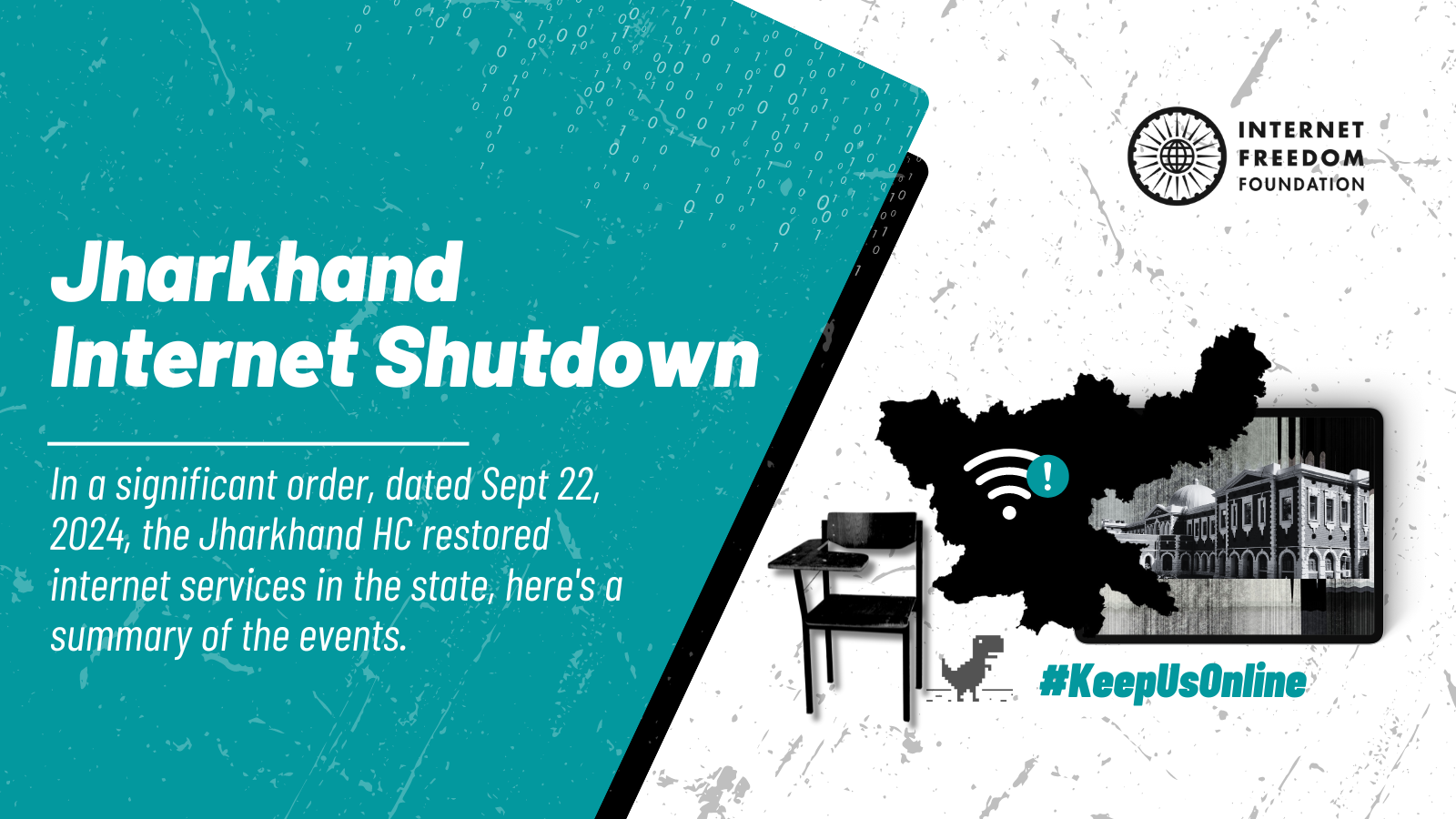
tl;dr
In an order dated September 22, 2024, the Jharkhand High Court restored internet services in the state, observing that merely adding the terms ‘public interest’, ‘adequate safety of students at large’, and ‘ensuring fair examination’, without any factual backing is not a sufficient ground to suspend all types of internet services in the entire state.
The order was issued in a matter challenging the internet suspension in the state of Jharkhand on September 21 and 22, 2024. On September 20, 2024, the Department of Home, Prison and Disaster Management, Government of Jharkhand issued a notification suspending mobile internet, mobile data and mobile wi-fi services of all mobile service providers in the state of Jharkhand citing concerns regarding the conduct of the Jharkhand General Graduate Level Competitive Examinations, 2023. Internet access was suspended from 8:00 a.m. to 1:30 p.m. on September 21 and September 22, 2024.
Subsequently, the notification was modified to suspend all types of internet services (including broadband connectivity based on fixed telephone lines, fibre and leased lines) of all service providers throughout the state of Jharkhand on September 22, 2024. While the court had refused to intervene with the earlier notification, the subsequent notification was stayed on the basis that it is an overreach of the earlier judicial order and infringed fundamental rights.
Why should you care?
The Supreme Court’s decision in Anuradha Bhasin v. Union of India stated access to the internet to be a fundamental right under the Indian Constitution, adding that any restriction on internet access must be temporary, limited in scope, lawful, necessary, and proportionate. Suspension of internet services, which causes huge economic loss and disruption in the day-to-day livelihood of small businesses, to prevent cheating, is not only highly disproportionate but also ineffective in curbing the menace of cheating. The economic, psychological, social, and journalistic harm caused by such suspensions outweighs any speculative benefits as, amongst other things, residents of the affected areas are unable to communicate, carry on with their businesses, trades or professions, continue their education or verify news that they receive.
Background
Internet suspensions, while legally permissible, must follow procedures and safeguards set down in law, including the Temporary Suspension of Telecom Services (Public Emergency or Public Safety) Rules, 2017 (“Telecom Suspension Rules”), and also the Supreme Court’s guidelines in Anuradha Bhasin.
On September 20, 2024, the Department of Home, Prison and Disaster Management, Government of Jharkhand issued an order suspending mobile internet, mobile data, and mobile wi-fi services of all mobile service providers in the state of Jharkhand from 8:00 a.m. to 1:30 p.m. on September 21 and September 22, 2024. The order had been passed in the wake of certain concerns “observed in previous instances that some unscrupulous individuals resorted to unfair practices utilizing various mobile applications, such as Facebook, WhatsApp, X (Twitter), Telegram and YouTube, which rely on internet/Wi-Fi connectivity”. Another stated concern was that of the spread of fake news regarding paper-leaks and/or accidents as a result of candidates travelling across districts to write the examination and that it sought “to eliminate any loopholes in the examination process that may raise doubts in the public mind regarding the integrity of the recruitment process, potentially leading to law and order issues that could impact public safety”.
The Government’s Disproportionate Response
According to Section 5(2) of the Telegraph Act, 1885, internet suspensions must be issued only in the event of a public emergency or when there is a threat to public safety. The possibility of cheating in exams does not meet the legal threshold of an emergency, or that of a threat to public safety. In any event, while preventing cheating in exams is a legitimate goal, suspending internet services is a disproportionate response to achieve it. Such suspension not only affects the candidates but also brings to a halt the day-to-day lives of ordinary citizens. In 2023, internet suspensions cost the Indian economy $1.9 billion in the first half of the year, with a loss of nearly $118 million in foreign investment. The report by HRW & IFF highlights the impact that internet suspensions have on India’s poor and marginalised people, especially as the Digital India project makes internet access essential for accessing subsidised food grains, rural employment schemes, and e-governance assistance in rural areas. During such suspensions, many government schemes which make use of internet resources will be affected. Less restrictive alternatives such as ensuring proper invigilation and deployment of jammers at test centres can prevent cheating without stifling citizen’s fundamental right to access information on the internet.
The Supreme Court in Anuradha Bhasin v. Union of India ruled that orders for internet shutdown must satisfy the tests of necessity and proportionality. There are multiple petitions challenging frequent and indiscriminate internet suspensions before various courts, such as at the Rajasthan High Court and the Gauhati High Court. In fact, the Calcutta High Court had previously in Ashlesh Biradar v. State of West Bengal stayed a notification suspending internet on the days of Madhyamik Pariksha (Secondary Examination), 2022 as it violated Supreme Court of India guidelines on internet suspensions and had been unlawfully issued.
The Role of the Review Committee
The Telecom Suspension Rules also mandate that the suspension order must be sent the very next working day to a review committee, which must meet within five working days. Moreover, the review committee is tasked with convening a meeting to record its findings on the legality of the notification and to urgently consider whether the internet suspension is required for the purpose mentioned in the notification. While this is not, by any means, sufficient oversight over the internet suspension process, it is nevertheless, the only oversight mechanism that has been provided under law for internet suspensions. As such, its decisions are crucial for transparency in what is otherwise a highly opaque framework. However, as the notification on September 20, 2024 (Friday) specifies internet services to be suspended on September 21 and 22, 2024 (Saturday and Sunday, respectively), the review committee’s role in assessing the validity and legality of the notification is rendered moot. The role of the review committee is critical in assessing the legality of the process, and such instances reduce its important role under the law as irrelevant. This is especially important in light of recent developments such as the draft Temporary Suspension of Telecommunication Services Rules, 2024.
Proceedings before the High Court of Jharkhand
A public interest litigation was filed before the Jharkhand High Court on September 21, 2024, challenging the suspension of mobile data services in the state of Jharkhand. The High Court, in its order dated September 21, 2024, refused to stay the operation of the notification since it was only a partial disablement (i.e. only the mobile data, mobile internet, and mobile wifi, had been directed to be suspended from 08.00 AM to 01.30 PM on September 21 and 22, 2024) and that internet services were not disable in totality.
Subsequently, the notification was modified to suspend all types of internet services (including broadband connectivity based on fixed telephone lines, fibre, and leased lines) of all service providers throughout the state of Jharkhand on September 22, 2024.
In its order dated September 22, 2024, the court observed that the subsequent modification by the state amounts to an overreach of the judicial order passed by the court, stating that the “interim order passed by this Court reveals that the balance of convenience between the parties was taken into consideration, i.e., the balance of convenience between the public at large and the concern of the State to conduct a proper examination, but the balance itself has been disturbed by the fresh action of the State”.
The court reiterated that suspension of internet services amounts to an infringement of fundamental rights enshrined under Article 19 of the Indian Constitution, adding that no internet services are to be suspended in the state to conduct examinations without leave of the court till the pendency of the petition.
#KeepUsOnline!
Internet shutdowns negatively impact the rights and freedoms of the citizens affected, and India has especially borne the brunt of these infringements in the last few years. IFF has been consistently fighting against internet shutdowns and violations of digital rights wherever they occur in India. Over the last few years, we've been involved in multiple challenges to internet shutdowns across the various High Courts and the Supreme Court. Read more about it here.
Important Documents
- Jharkhand High Court order dated September 21, 2024 (link)
- Jharkhand High Court order dated September 22, 2024 (link)
- Calcutta High Court order dated March 10, 2022, in Ashlesh Biradar v. State of West Bengal (link)
- Notification issued by the Department of Home, Prison and Disaster Management, Government of Jharkhand dated September 20, 2024 (link)
- Notification issued by the Department of Home, Prison and Disaster Management, Government of Jharkhand dated September 22, 2024 (link)
- “No Internet Means No Work, No Pay, No Food”, A report by Human Rights Watch and Internet Freedom Foundation on the impact of internet shutdowns (link)
We would like to thank Advocate Abhinav Sekhri for reviewing this blog.

